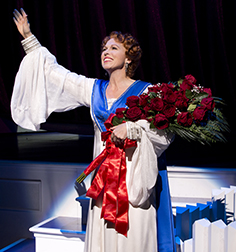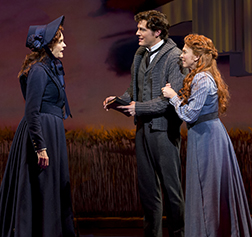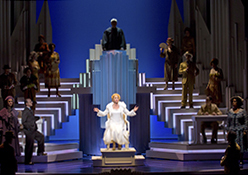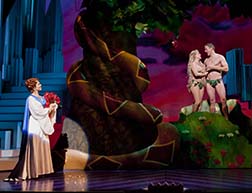By Lucy Komisar

“A woman who behaves never writes history” was the motto of Aimee Semple McPherson, who beginning in the 1920s became a media phenomenon. This smashing and smartly staged production shows how the farm girl who wanted to be an actress turned Pentecostal preaching into a theatrical art form, for two decades besting envious men and winning millions of followers to her radio programs and giant Hollywood temple.
She was one of America‘s early media celebrities, self-invented and then propelled into the American eye by gossip columnists such as Louella Parsons and scandal-seeking reporters. She is portrayed in fascinating dimensions in Kathie Lee Gifford’s musical play directed by David Armstrong. Carolee Carmello, who has a colorful, rich and powerful voice, brilliantly channels the young woman who had a sense of drama as a teenager and then moved that into a big tent and radio sensation that mesmerized more people that had ever attended a church service before.

Starting with her trial on charges she staged a kidnap to cover up a tryst with a married lover, Kenneth Ormiston (Andrew Samonsky), the technician who helped set up her radio operation, the play takes us back to a 17-year-old with a harsh religious mother (Candy Buckley). Partly to get away, Aimee marries Robert Semple (Edward Watts), an Irish Pentacostal missionary. He dies of malaria two months after their arrival in China. She has a child and no future, and takes the way out by marrying an accountant, who would supply the McPherson of her name.
Speaking of names, interesting that Aimee (pronounced Amy) means loved in French. Was her mother more sophisticated than imagined?
Aimee herself was no housewife. A “voice” tells her to go and spread the word. From New York she makes her way west, stopping at a factory town and then a Kansas City bordello. In KC, Aimee picks up the Madam (Roz Ryan) who is “saved” and becomes her confidant and assistant. Ryan is terrific, sassy in the role.

But charismatic Aimee was made for Hollywood and it was made for her, especially the costumes and pageantry, the over the top tent revival which are religion at its core. She became a media superstar. The first religious superstar. (OK, exclude the Pope.) She mixed with Hollywood personalities such as Charlie Chaplin and power figures such as publisher William Randolph Hearst. She also made some enemies, the little men who envied her.
Her mother, who left the farm and her husband to work for the Salvation Army in New York, also joined operation. You get the sense this was big business.
Sometimes there‘s a musical sameness to the production. The songs all seem to build to crescendos. There are a lot of “God loves you” rousing, standup evangelical moments. But there are some good jazzy numbers, too, especially the Kenny Ormiston (Andrew Samonsky) one which makes you move to the beat.

Aimee built a Los Angeles megachurch, the Angelus Temple, in 1923. It was a great stage for the Hollywood church lady whose white robes and blue capes became sequined as she moved to show biz. Choreographer Lorin Latarro matches her theatricality in numbers that show scantily clad Adam and Eve in the Garden of Eden or Egypt‘s Pharaoh in a chariot calling down plagues on the Israelis. Big time Hollywood movies couldn‘t have done better. (Hard to believe they really did this!)
The scenes get artful backdrops by set designer Walt Spangler. I especially liked the charming silhouettes and colors that showed farm and factory town.
Post scripts about Aimee not mentioned in the play: Her services were racially integrated. She was anti-secular and against teaching about evolution.
Some people have challenged Kathie Lee Gifford as playwright because she supports the evangelical church Aimee Semple McPherson founded. That is stupid. Everyone writes about what he/she knows. And in this case Ms. Gifford created a terrific and honest production.
Scandalous: The Life and Trials of Aimee Semple McPherson. Book & lyrics by Kathie Lee Gifford; music by David Pomeranz and David Friedman; directed by David Armstrong. Neil Simon Theatre, 250 West 52nd Street, New York City. 212-307-4100. Opened Nov. 15, 2012, closes Dec 16, 2012.

